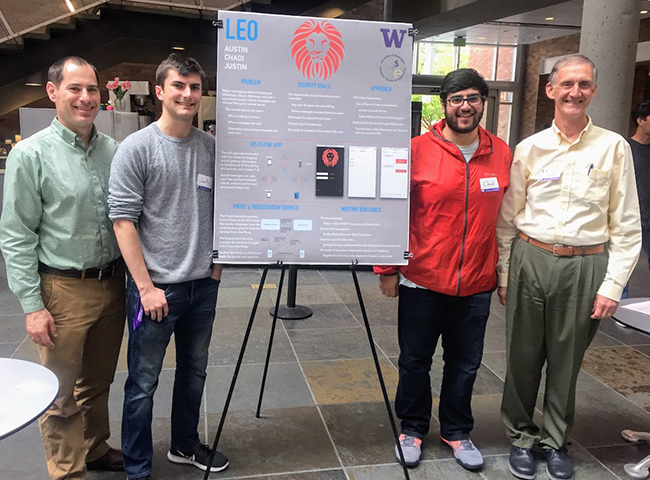
From left: professor Dan Grossman, students Justin Kotalik and Chadi Moussi, and professor Ed Lazowska at the end-of-year poster fair
Each year our amazing Allen School undergraduates spend many hours combining their creativity and problem-solving skills with their technical computing acumen to design and implement course projects, particularly in our senior-level courses and capstone design courses. At the end of each quarter, the Microsoft Atrium in the Paul G. Allen Center hosts a variety of course-specific poster sessions where students describe what they have accomplished. Last week, we tried something new: a school-wide, end-of-year poster session where student teams from across the curriculum could reprise their posters and talk about their work with a broader audience.
Participating teams also competed for a prize awarded by Allen School alumni and friends serving as judges. Our volunteer panel evaluated the students’ work based on technical achievement, creativity, presentation, and potential for impact. After viewing all 19 projects on display — which spanned programming languages, natural language processing, data visualization, mobile apps, robotics, and more — the judges selected two for special recognition: “Leo,” a decentralized chat app for iOS that provides end-to-end encryption for mobile messaging, and “Global Terrorism,” an interactive data visualization tool for objectively presenting and analyzing information on terrorist attacks.
The winning project, Leo, was developed by computer science undergraduate Austin Bhisharat, computer engineering undergraduate Justin Kotalik, and combined bachelor’s/master’s student Chadi Moussi to address security concerns with popular mobile messaging apps. These apps typically rely on a central server to relay messages between sender and recipient, which enables them to collect metadata about users’ communications as the messages pass through a central server. With Leo, messages are encrypted and sent peer-to-peer, preventing any single entity from knowing who is communicating with whom or when.
Honorable mention went to the Global Terrorism data project, which was developed by computer science undergraduates Sheen Dudwadkar, Carson Gulledge, Michelle Lee, and Grace Qiu. The team created a narrative visualization tool that enables citizens to explore data and questions about terrorism themselves, without going through the filter of emotionally and politically charged media coverage.
Learn more about all 19 featured projects here.
Congratulations to our winners and to all the students who participated — and many thanks to the extended Allen School family for supporting our undergraduates!

